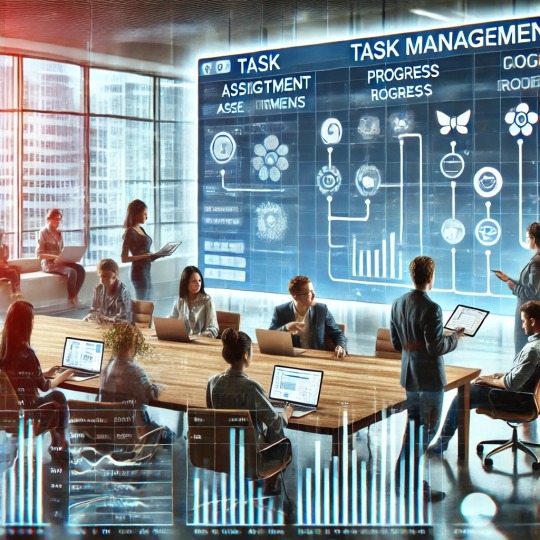#Project Collaboration
Explore tagged Tumblr posts
Text
Future-Ready Forecasts | Why Smart Projects Trust a Commercial Estimating Service
Introduction
In the fast-paced world of commercial construction, uncertainty is a constant. Market fluctuations, labor shortages, changing regulations, and unpredictable global events can all affect the costs and timelines of construction projects. To mitigate these risks, forward-thinking developers and contractors rely on a commercial estimating service to provide accurate forecasts. These services help in not only predicting costs but also in preparing for the challenges that may arise during the construction process. This article explores the importance of using commercial estimating services for future-ready forecasts and why they are trusted by the most successful construction projects.
Understanding the Role of Commercial Estimating Services
A commercial estimating service provides detailed cost breakdowns for a project, considering every possible expense, from materials and labor to permits and equipment. However, the value of such a service extends beyond simple cost prediction. Estimators use advanced software, historical data, and market intelligence to predict future costs with a high degree of accuracy. These forecasts enable project stakeholders to plan better and make informed decisions before, during, and after construction.
Staying Ahead of Market Fluctuations
The construction industry is subject to numerous market fluctuations, such as shifts in the prices of raw materials, fuel, and labor. A commercial estimating service stays ahead of these changes by continuously monitoring market trends and adjusting cost predictions accordingly. For example, if steel prices are expected to rise due to a global shortage, estimators can incorporate these changes into their forecasts. By anticipating price increases or decreases, the estimating service helps projects stay on budget and avoid unpleasant surprises.
Predicting Labor Costs and Availability
Labor costs are one of the most volatile aspects of any construction project. From changes in union agreements to labor shortages and immigration laws, labor costs can fluctuate significantly. A commercial estimating service uses historical data and market analysis to predict potential labor cost increases and the availability of skilled workers. With this information, project managers can plan for workforce needs more effectively, adjusting timelines and budgets to reflect potential changes in labor availability.
Mitigating the Risks of Supply Chain Disruptions
Supply chain disruptions have become a significant concern for the construction industry, especially in the wake of the COVID-19 pandemic. Materials may be delayed, and shipping costs may increase due to global supply chain issues. A commercial estimating service can help anticipate these challenges by incorporating potential delays and cost increases into their forecasts. By factoring in these risks, estimators help project managers plan ahead and prepare contingency strategies, ensuring the project continues to move forward even when external factors disrupt the supply chain.
Using Technology to Improve Forecast Accuracy
Modern commercial estimating services leverage cutting-edge technology, such as 3D modeling, Building Information Modeling (BIM), and artificial intelligence, to improve the accuracy of cost forecasts. These technologies allow estimators to simulate different scenarios and predict outcomes more precisely. For instance, BIM allows the team to visualize the project in three dimensions, helping to identify potential cost issues before construction begins. AI algorithms can analyze vast amounts of historical data to predict cost trends and provide more accurate future forecasts.
Ensuring Accurate Scheduling and Cost Control
Estimating services do more than just predict costs—they also help in maintaining project schedules. By providing detailed cost breakdowns and timelines, commercial estimating services help ensure that projects are completed on time and within budget. Accurate scheduling based on future-ready forecasts reduces the risk of delays, which are often caused by unforeseen costs. If material prices increase or if additional labor is required, estimators can adjust the project’s schedule accordingly, ensuring that the work progresses smoothly.
Providing Strategic Decision-Making Support
A commercial estimating service also supports strategic decision-making by offering comprehensive cost analyses. These services provide developers and contractors with a clear picture of the financial health of a project, enabling them to make informed decisions about project scope, material selection, and financing. By using accurate cost forecasts, project stakeholders can evaluate different strategies, choose the most cost-effective options, and ensure that their decisions align with long-term financial goals.
Improving Project Collaboration
Construction projects often involve multiple stakeholders, including developers, architects, contractors, and subcontractors. A commercial estimating service facilitates collaboration by providing a single, reliable source of cost information. When all stakeholders have access to accurate forecasts, they can work together more effectively, align their expectations, and avoid misunderstandings about budget and timeline. Clear communication based on trusted cost estimates leads to smoother project execution and better overall results.
Conclusion
A commercial estimating service is more than just a tool for predicting project costs; it is an essential resource for ensuring that construction projects remain future-ready. By leveraging technology, monitoring market fluctuations, and providing accurate labor cost predictions, these services help mitigate risks and provide developers and contractors with the insights needed to make informed decisions. With the increasing complexity of modern construction projects, the importance of using a commercial estimating service to forecast future costs and manage risks cannot be overstated. Projects that trust commercial estimating services are better prepared to navigate the uncertainties of the construction world and successfully deliver projects on time and within budget.
#commercial estimating#cost forecasting#labor costs#market fluctuations#supply chain disruptions#construction budget#cost management#risk mitigation#building information modeling#BIM#project scheduling#construction timelines#future-ready forecasts#cost prediction#strategic decision-making#construction technology#artificial intelligence#cost control#project collaboration#building materials#labor availability#project management#supply chain analysis#construction costs#financial planning#technology in construction#estimating software#budget planning#construction risk#predictive analytics
0 notes
Text
How to Choose the Right UI/UX Design Agency for Your Project
Selecting the perfect UI/UX design agency is a critical step in ensuring the success of your digital project. A well-designed user interface and user experience can significantly enhance user engagement, drive conversions, and bolster your brand identity. Here's a guide to help you navigate this important decision and find the ideal partner for your needs.
1. Understand Your Project Requirements
Before you begin your search, clearly define your project's goals, scope, and budget. Are you launching a mobile app, redesigning a website, or creating an entirely new platform? Knowing your requirements will help you communicate effectively with potential agencies and ensure alignment.
Key Considerations:
Target audience and user personas
Project timeline and milestones
Desired features and functionalities
2. Look for Relevant Experience
An agency's portfolio is a window into their expertise. Examine their previous projects to assess their experience in your industry or with similar project types. Look for case studies and testimonials that showcase their problem-solving skills and innovative designs.
Tip:
For specialized services, consider agencies with proven expertise. For example, Ynodesigns offers comprehensive solutions with experienced UX UI designers who understand diverse project requirements.
3. Evaluate Their Design Process
A transparent and structured design process is essential for delivering high-quality results. During your discussions, ask about their approach to:
User research and analysis
Wireframing and prototyping
Usability testing and feedback integration
This will give you insight into how they handle challenges and ensure a user-centered design.
4. Check Their Technical Capabilities
UI/UX design isn’t just about aesthetics; it’s also about functionality and performance. Make sure the agency is familiar with the latest design tools, technologies, and trends. Additionally, they should have a deep understanding of responsive design, accessibility standards, and performance optimization.
5. Assess Communication and Collaboration
Effective communication is key to a successful partnership. Choose an agency that prioritizes regular updates, listens to your feedback, and collaborates closely with your team. A reliable UI UX design agency like Ynodesigns ensures seamless communication throughout the project.
6. Review Their Pricing and Value Proposition
While budget constraints are important, the cheapest option isn’t always the best. Focus on value over cost by considering what the agency brings to the table. High-quality design is an investment that pays off in the long run.
Questions to Ask:
What’s included in their pricing?
Do they offer post-launch support?
Can they scale their services as your project grows?
7. Request a Trial or Initial Consultation
Many agencies offer free consultations or small trial projects. Use this opportunity to gauge their understanding of your requirements, their creative approach, and their responsiveness.
Conclusion
Choosing the right UI/UX design agency is a decision that can shape the success of your project. By carefully evaluating your options, focusing on expertise, and prioritizing communication, you can find an agency that aligns with your vision. Partnering with experts like Ynodesigns ensures your project not only meets but exceeds expectations, delivering a seamless and engaging user experience.
#UI/UX design agency#choosing a design agency#UX/UI designers#Ynodesigns#UI/UX design tips#finding a design agency#user experience design#user interface design#hiring a design agency#design process#UI/UX portfolio#design agency communication#design agency pricing#responsive design#usability testing#digital project design#UX trends#UI trends#project collaboration#accessibility standards
1 note
·
View note
Text
Optimized Task Management for Enhanced Team Collaboration and Productivity
Task management systems streamline project workflows by enabling teams to assign, prioritize, and track tasks effectively. These platforms offer features like progress tracking, deadline reminders, and collaborative tools that ensure timely completion of projects. With clear visualizations of goals and responsibilities, task management solutions promote accountability and enhance team communication. Businesses can boost productivity, minimize delays, and achieve operational excellence by centralizing task organization.
More info: https://ahalts.com/products/hr-management

#Task Management#Project Collaboration#Task Tracking Software#Productivity Tools#Team Management#Workflow Optimization#Task Prioritization#Deadline Tracking#Project Organization
0 notes
Text
Unlocking Success: A Guide on How to Hire a Developer for Your Project
Embarking on a new project is both exciting and challenging, and finding the right developer can significantly impact its success. Whether you’re launching a website, developing a mobile app, or working on a software solution, the process of hiring a developer is a critical step. In this guide, we’ll walk you through the key considerations and steps to ensure you make the right choice when…

View On WordPress
#app development#Budgeting for Developers#Client Reviews#Coding Expertise#Collaborative Development#Developer Hiring Tips#Developer Interviews#Developer Selection#freelance developers#Hire a Developer#Hiring Process#Project Collaboration#Project Development#Project Management#Project Milestones#Project Scope#software development#Tech Skills#Technical Requirements#Web development
1 note
·
View note
Text

Guardian Angel
#I drew this as a collaborative project of sorts! it was a lot of fun and a huge honor to participate 💙#mouthwashing#Curlya#anya mouthwashing#curly mouthwashing#captain curly#nurse anya#post crash recovery au#mouthwashing art#myart
481 notes
·
View notes
Text




ODILE BLAST collaborative piece!!!
the sketch is by @sketchz
lineart done by yours truly the bogkeep haiz
and colors/final touches are done by laviceae on twitter!
#in stars and time#odile isat#art#fanart#digital art#collaboration art#the discord server is doing fun collab projects and this one is a delight#im so stoked about how this turned out
4K notes
·
View notes
Text

Xenoblade Chronicles X
#Regulus#@SirKnightbot#Xenoblade Chronicles X#PC-98 style#made for Xenoblade fan-collaboration Artbook Project#Xeno Compendium#illustration#art#design#color#style#mecha#mech#robot#PC-98#ドット絵#pixel art#pixel design#video game art
582 notes
·
View notes
Text
man and re: the guy who owes me tens of thousands of dollars. that's not even counting the labor I did for him. and the utter lack of credit I get for being instrumental in building His Whole Thing like ... I did almost all the behind the scenes "soft labor" stuff for that initially, the networking, the community building, seeking out potential stud dogs, paying for transportation or other breeding related costs, helping with screening ppl for puppy placement, just the TALKING and social component, running the FB group. helping raise the puppies. uncompensated of course. did you know who came up with the name for it. LMAO. meeeeee
I avoided talking about this in any way for so long because I didn't want it to be perceived as some kind of call-out post or some kind of dogbook vague blog backbiting bullshit. and partially bc I'm sure if he saw it he would have Stories about how this was All Okay Actually or I Was Mean Too. but actually as it turns out I am allowed to talk about experiences that I had with a person that deeply impacted my life on my own fucking blog. :)
#i came up with the name vulpine spitz it was me.#hitting a wasp nest with this one but idc. im tired of being maria lucas editing the star wars scripts LMFAO#in spite of this it was never Our Collaborative Project it was All His#and when people praise it they are always like wow its amazing what hes built!#lolololololol.#anyway never give a guy like this all your time and labor. btw.#do not do it.#also i have him blocked so please do not show him this post i dont want to see or be seen by him#unless it is him paying me back :)#idk how he has this effect on people they just dive in to take care of him#and prevent him from experiencing tje consequences of his behavior
195 notes
·
View notes
Text

Meiling's new glasses!
This is a collab I made with @SerenityWh74161!
#art#chibi#game#fanart#touhou#comic#touhou project#collaboration#art collab#hong meiling#sakuya izayoi
323 notes
·
View notes
Text
The Digital Shift | How Tech is Redefining Industrial Estimating Service
Introduction: The Role of Technology in Modern Industrial Estimating The industrial sector, once reliant on traditional methods of estimating project costs, has entered a new era where technology is reshaping how projects are planned, managed, and executed. In particular, industrial estimating services are benefiting from the integration of cutting-edge technology that enhances accuracy, efficiency, and overall project outcomes. As industries adopt advanced digital tools, the way cost estimates are generated and managed has evolved significantly, streamlining workflows, improving decision-making, and reducing the risks associated with manual errors and outdated practices.
The Shift from Manual Estimating to Digital Tools For many years, industrial estimating was a manual process that involved spreadsheets, paper-based plans, and extensive calculations. While these methods worked, they were time-consuming and prone to human error. Today, however, digital tools such as Building Information Modeling (BIM), 3D modeling, cloud-based estimating software, and artificial intelligence (AI) are transforming how industrial projects are estimated.
These technologies provide estimators with more powerful, accurate, and efficient means of calculating project costs. For instance, BIM allows for the creation of detailed, 3D models of a project, enabling estimators to visualize the design and identify potential issues before construction begins. This can lead to more accurate estimates and fewer surprises during the construction phase.
Building Information Modeling (BIM): Revolutionizing the Estimating Process BIM has revolutionized the way construction projects are designed and estimated. In industrial projects, BIM provides a detailed, virtual representation of the entire project, including every structural element, material, and system. This digital model allows estimators to see the project in its entirety and calculate accurate costs based on real-time data.
BIM helps estimators identify potential conflicts or inefficiencies in the design early on, reducing the likelihood of costly mistakes. For example, by modeling the mechanical, electrical, and plumbing systems in 3D, estimators can spot clashes or design issues that may lead to delays or cost overruns. This proactive approach allows estimators to adjust the design or budget before construction begins, improving the overall accuracy of the estimate.
Moreover, BIM allows for seamless collaboration between different stakeholders, such as architects, engineers, and contractors. Estimators can share the digital model with the entire project team, ensuring that everyone is on the same page and working toward the same goal.
Cloud-Based Estimating Software: Collaboration and Accessibility Cloud-based estimating software has become a game-changer for industrial estimating services. Unlike traditional desktop-based software, cloud-based solutions allow estimators to access project data from anywhere, at any time. This enhances collaboration between team members, contractors, and clients, as everyone can work from the same platform and update the estimate in real time.
Cloud-based software also provides the flexibility to store and organize vast amounts of project data, including cost breakdowns, material lists, and labor schedules. This data is securely stored in the cloud, ensuring that project details are accessible and up-to-date, even as changes occur during the project's lifecycle.
Additionally, cloud-based software can integrate with other project management tools, such as scheduling and procurement software. This enables estimators to track changes in real-time and adjust the cost estimates accordingly. For example, if there is a delay in material delivery, the estimator can update the estimate immediately, helping to keep the project on track and prevent cost overruns.
Artificial Intelligence and Machine Learning: Predictive Estimating Artificial intelligence (AI) and machine learning (ML) are increasingly being used in industrial estimating services to improve the accuracy and efficiency of cost predictions. By analyzing vast amounts of historical data, AI and ML algorithms can identify patterns and trends that human estimators may overlook.
For example, AI can help predict material costs based on historical pricing data, accounting for factors like inflation and market fluctuations. This allows estimators to generate more accurate cost projections, even in volatile markets. AI can also help identify potential risks, such as supply chain disruptions, that may impact project timelines or costs.
Machine learning algorithms can continuously improve over time as they are exposed to more data, allowing estimators to refine their predictions and enhance their accuracy. The ability to leverage AI and ML in the estimating process helps reduce the likelihood of cost overruns and ensures that projects stay within budget.
Real-Time Data and Analytics: Making Informed Decisions In the past, estimators relied on static data, such as historical cost records and vendor quotes, to generate project estimates. However, with the rise of real-time data and analytics, industrial estimators now have access to more dynamic and up-to-date information that can impact their cost predictions.
For instance, cloud-based platforms and integrated project management systems allow estimators to access live pricing data, including current material costs, labor rates, and equipment rental fees. This real-time information helps estimators make more accurate predictions and adjust their estimates based on the latest market conditions.
Real-time data also allows estimators to track project progress more closely, monitoring any changes in scope or schedule that may affect costs. With up-to-date information at their fingertips, estimators can make informed decisions about how to adjust the budget or timeline, ensuring that the project stays on track and within budget.
Digital Integration with Supply Chain and Procurement Technology is also enhancing the way industrial estimating services interact with supply chain and procurement systems. With digital tools, estimators can easily integrate their cost estimates with procurement data, allowing them to track material availability, supplier lead times, and pricing fluctuations in real-time.
This integration helps prevent delays caused by supply chain disruptions and ensures that estimators can adjust their cost estimates as material prices fluctuate. For example, if a material becomes more expensive due to a global shortage, the estimator can immediately update the cost estimate and notify stakeholders of the potential impact on the project budget.
By streamlining the procurement process and connecting it directly to the estimating system, industrial estimators can avoid costly delays and keep the project moving forward.
The Future of Industrial Estimating: Virtual and Augmented Reality Looking ahead, virtual and augmented reality (VR and AR) are set to play an even more significant role in industrial estimating services. With VR and AR, estimators can create immersive, 3D simulations of the project, allowing them to visualize the construction process and identify potential issues before the project begins.
For example, by using AR glasses, estimators can overlay digital models onto the physical site, providing a real-time view of how the project will look once completed. This technology can help estimators identify issues related to space, design, or logistics that may not be apparent in traditional 2D drawings.
Incorporating VR and AR into the estimating process allows for better decision-making and a more accurate understanding of how the project will progress. As these technologies continue to evolve, industrial estimating services will become even more precise and efficient.
Conclusion: Embracing the Digital Shift for Better Industrial Estimating The digital shift is transforming the way industrial estimating services operate, bringing about improvements in accuracy, efficiency, and collaboration. From BIM and cloud-based software to AI and real-time data, technology is enabling industrial estimators to generate more precise cost estimates, reduce risks, and streamline the estimating process.
By embracing these digital tools, industrial estimating services can provide more reliable estimates that help projects stay within budget and on schedule. As technology continues to evolve, the potential for further improvements in estimating accuracy and efficiency is immense, and those who adopt these tools will be better equipped to navigate the complexities of modern industrial construction.
#digital shift#industrial estimating service#Building Information Modeling#BIM#cloud-based estimating#AI in estimating#machine learning#real-time data#predictive estimating#industrial construction#procurement integration#cost estimating software#augmented reality#virtual reality#project management software#cost forecasting#risk management#material costs#labor rates#supply chain disruptions#data analytics#construction delays#technology in construction#digital tools#cost prediction#construction efficiency#estimating accuracy#project collaboration#immersive technology#VR in construction
0 notes
Text











And So, the Clock Hands Started Ticking card transparents (plus birthday Saki and Touhou Miku).
@sekaitransparents
#project sekai#proseka#transparent#transparents#card transparents#png#and so the clock hands started ticking#asahina mafuyu#mafuyu asahina#yoisaki kanade#kanade yoisaki#kagamine len#niigo len#25ji len#n25 len#akiyama mizuki#mizuki akiyama#shinonome ena#ena shinonome#25 ji nightcord de#25ji nightcord de#nightcord at 25:00#tenma saki#saki tenma#birthday card#hatsune miku#vs miku#touhou project collaboration
287 notes
·
View notes
Text

Another conclave wip.. I love middle aged chibi animals
#so happy with these#collaborative project#wip#conclave#conclave fanart#conclave 2024#conclave 2024 fanart#vincent benitez#thomas lawrence#joshua adeyemi#goffredo tedesco
176 notes
·
View notes
Text
Project Sekai x Enstars Collab!!
[ROF-MAO | Bring It On] - Because my desire for it to start is overwhelming. They all work so well together!
.
.
.
.
.
Remember that my commission are open!! 😁
#pjsk fanart#project sekai colorful stage#tenma tsukasa#tsukasa#rui kamishiro#toya aoyagi#akito shinonome#vbs#wxs#meme animation#animation meme#Rofmao#enstars#ensemble stars fanart#chiaki morisawa#natsume sakasaki#izumi sena#jun sazanami#animatic#wonderland showtime#vivid bad squad#prosekai#collaboration#project sekai#my art#commission open#commission#digital art#fanart
261 notes
·
View notes
Text

Quackity just announced his new project!
#Quackity#Man knows how to market himself#''Drama? Nah. Look at my cool project''#Love him for that#January 12 2025#He said he wants creators to have the ability to keep collaborating with each other#Love that#And literally so proud of him for taking a stupid situation and using it to promote something so cool that unites communities
287 notes
·
View notes
Text










vine boom crash sound
#project sekai#prsk#pjsk#プロジェクトセカイ#プロセカ#enstars#ensemble stars#enstars pjsekai collab#ensemble stars x project sekai collaboration
187 notes
·
View notes